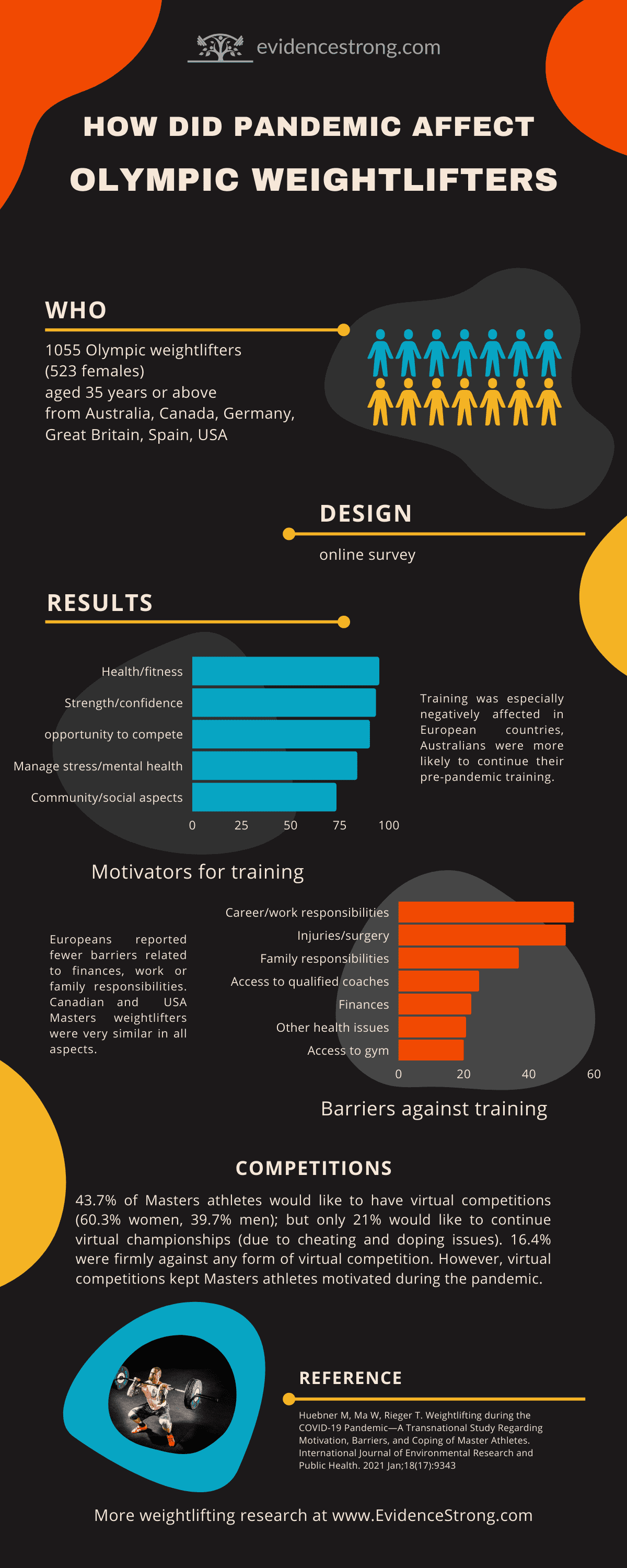Summary of a study surveying Masters Olympic weightlifters about the impact of the pandemic on their training.
Who
1055 Olympic weightlifters (523 females) aged 35 years or above (Australia, Canada, Germany, Great Britain, Spain, USA).
Design
Online survey.
Outcome measures
- motivations to continue weightlifting training
- barriers to continue training during the pandemic
- impact of the pandemic
Main results
- Motivators to do weightlifting as a Masters athlete:
- to maintain fitness 95.1%
- to build strength and confidence 93.4%
- opportunity to compete 90.3%
- Main barriers to weightlifting:
- for younger Masters athletes:
- work and career responsibilities 53.8%
- family responsibilities 36.9%
- for older Masters athletes:
- injuries 51.3%
- health issues 20.7%
- for younger Masters athletes:
- During the pandemic, 20% of Masters athletes struggled with access to training facilities and qualified coaches. Coping strategies included using online tools by 37%, remote coaching by 25%, and finding new ways to stay physically active by 55%.
- 43.7% of Masters athletes would like to have virtual competitions (women 60.3%, men 39.7%); but only 21% would like to continue virtual championships (due to cheating and doping issues); 16.4% were firmly against any form of virtual competition. However, virtual competitions kept Masters athletes motivated during the pandemic.
- Training was especially negatively affected in European countries, Australians were more likely to continue their pre-pandemic training.
- Europeans reported fewer barriers related to finances, work, or family responsibilities. Canadian and USA Masters weightlifters were very similar in all aspects.
Take home message
For a clinician & coach
During the pandemic, 20% of Masters athletes struggled with access to training facilities and qualified coaches. Coping strategies included using online tools by 37%, remote coaching by 25%, and finding new ways to stay physically active by 55%. Virtual competitions kept Masters athletes motivated during the pandemic. Training was especially negatively affected in European countries, Australians were more likely to continue their pre-pandemic training. Europeans reported fewer barriers related to finances, work, or family responsibilities. Canadian and USA Masters weightlifters were very similar in all aspects.
For a parent
During the pandemic, 20% of Masters athletes struggled with access to training facilities and qualified coaches. Coping strategies included using online tools by 37%, remote coaching by 25%, and finding new ways to stay physically active by 55%. Virtual competitions kept Masters athletes motivated during the pandemic.
For an athlete
During the pandemic, 20% of Masters athletes struggled with access to training facilities and qualified coaches. Coping strategies included using online tools by 37%, remote coaching by 25%, and finding new ways to stay physically active by 55%. Virtual competitions kept Masters athletes motivated during the pandemic.
Original article
Huebner M, Ma W, Rieger T. Weightlifting during the COVID-19 Pandemic—A Transnational Study Regarding Motivation, Barriers, and Coping of Master Athletes. International Journal of Environmental Research and Public Health. 2021 Jan;18(17):9343.
You might want to read next
How much protein pre-menopausal athletes need?
How does calorie deficit influence muscle growth and strength?
